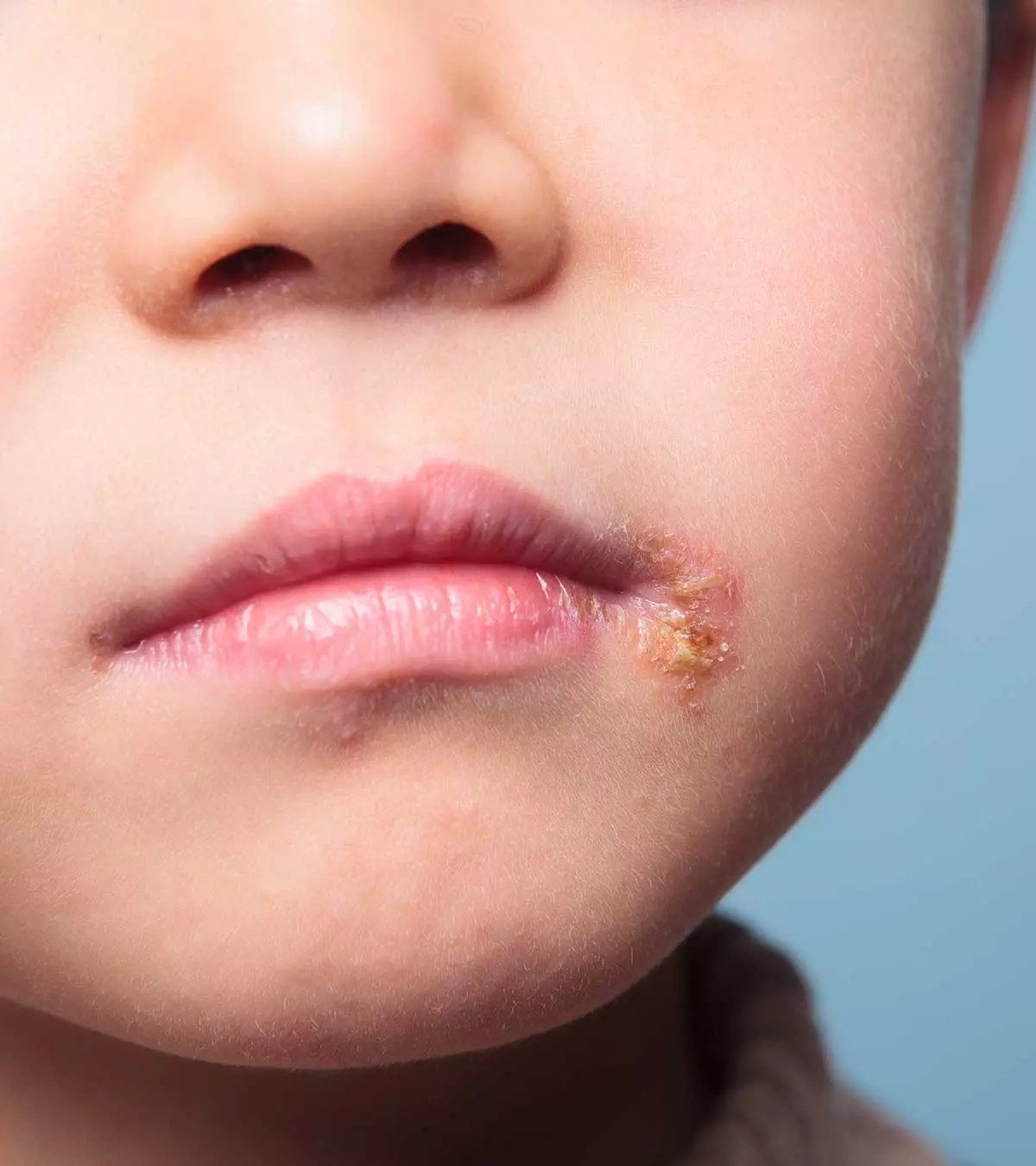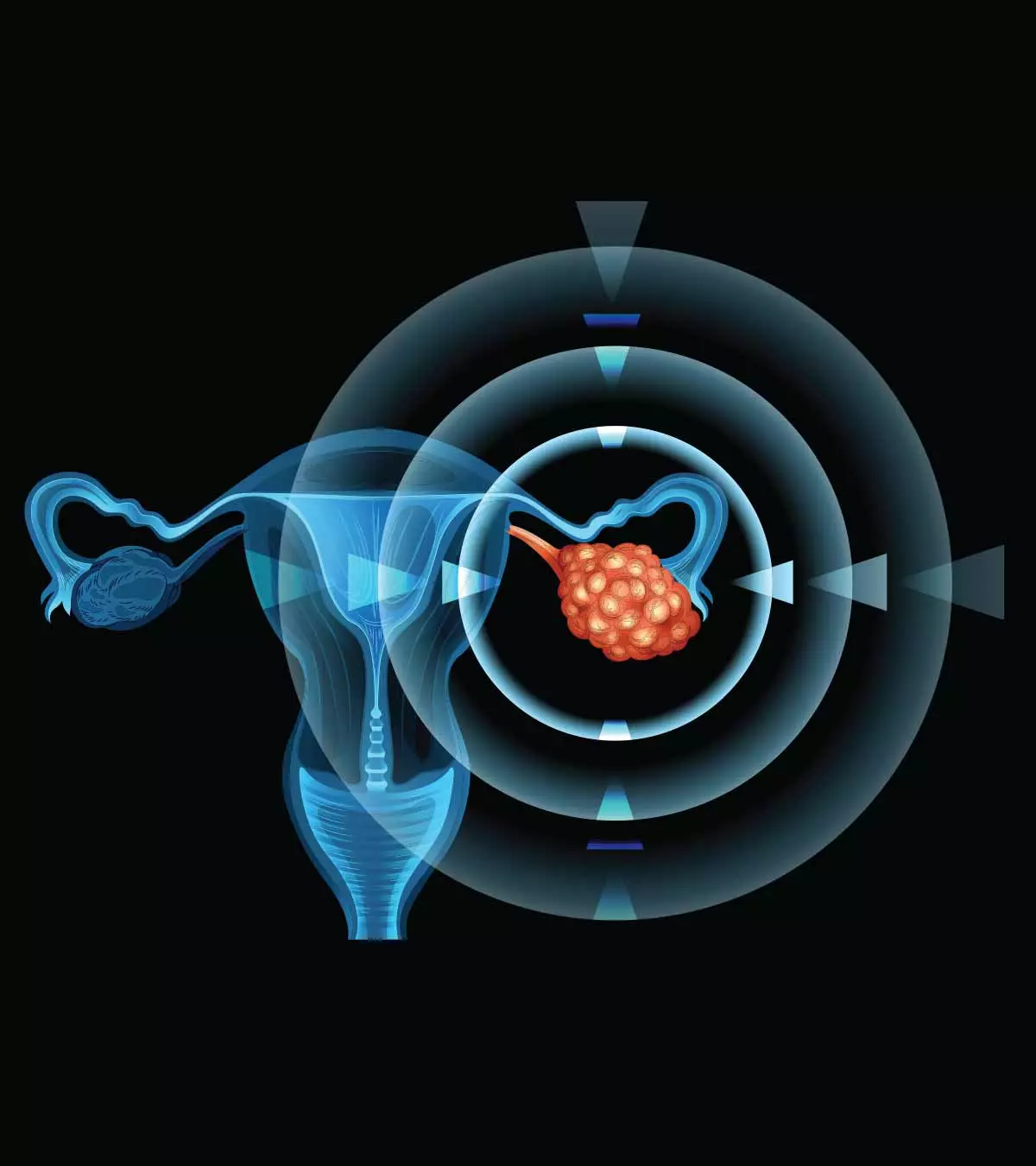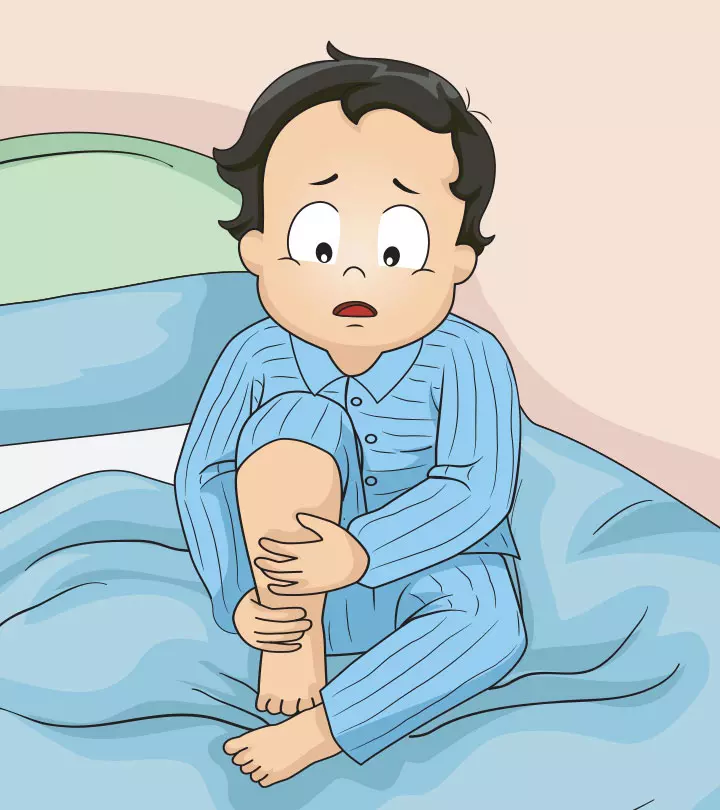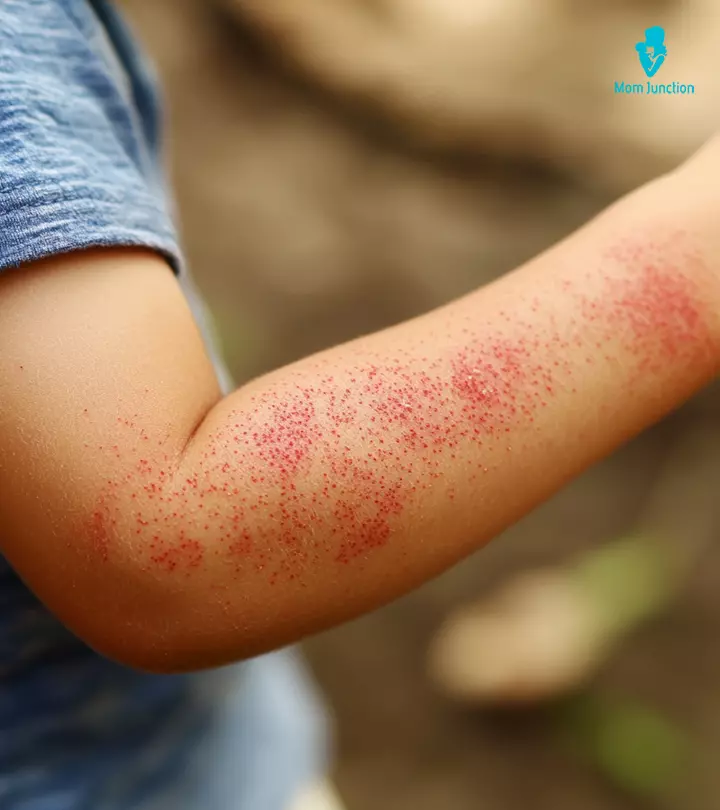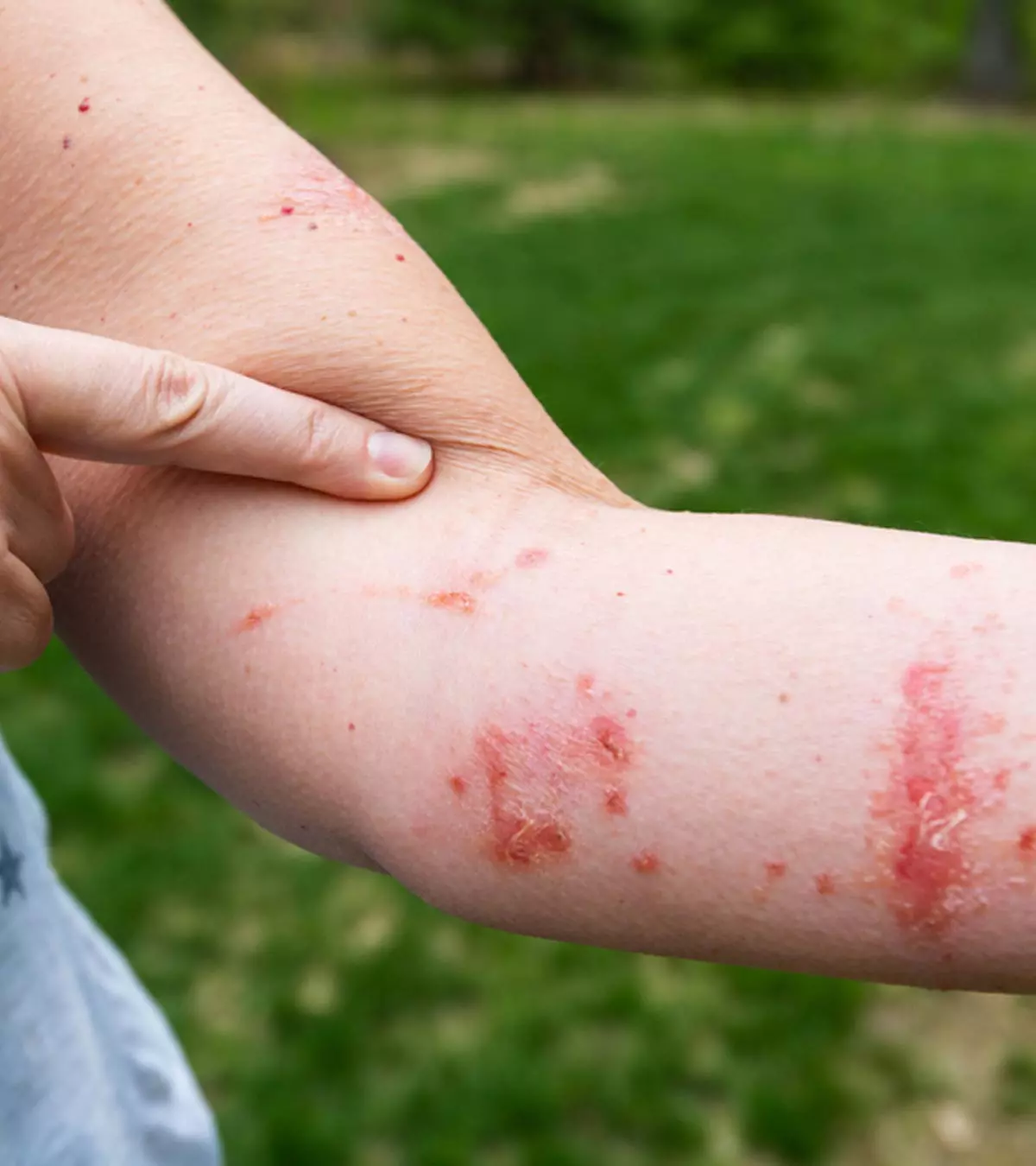
Image: iStock
Omega-3 fatty acids are essential fatty acids that promote heart health and are vital for proper growth and development. You can provide enough omega-3 for kids from a well-balanced diet. Omega-3 fatty acids have three types — docosahexaenoic acid (DHA), eicosapentaenoic acid (EPA), and alpha-linolenic acid (ALA).
DHA and EPA are long-chain fatty acids present in marine-based foods, such as oily fish, whereas short-chain omega-3 ALA is present in plant-origin foods, such as flax seeds and chia seeds (1) (2). Regular consumption of omega-3 can avert the risk of chronic diseases such as diabetes, arthritisiAn inflammatory condition affecting people of all ages, characterized by swelling, stiffness, and pain in the joints. , asthma, stroke, psychological problems, and some types of cancers.
Read on to know about the benefits, right dosage, and healthy food sources of omega-3 for children.
Key Pointers
- Omega-3 are essential fatty acids that ensure the overall development of children.
- Fish oils, different types of seeds, milk, and soy products are some of the foods containing omega-3.
- Children may safely consume omega-3 after consulting with a doctor about the recommended dosage.
- Possible side effects of omega-3 are upset stomach, heartburn, nausea, and diarrhea.
Can Children Take Omega-3 Fatty Acids?

Yes, children can take omega-3 fatty acids by incorporating foods rich in these nutrients into their diet. Dietary supplements, such as fish oil supplements, or plant-based options like algae oil for vegetarian families, are also available and may be used if diet alone does not provide the recommended amounts. You should talk to your pediatrician or a dietician before giving omega-3 fatty acid supplements to your child (3).
What Are The Benefits Of Omega-3 For Children?
There are several therapeutic benefits of omega-3s. Omega-3 and omega-6 fatty acids are constituents of the cell membrane. They regulate cell membrane properties such as fluidity, permeability, and flexibility. These fatty acids also play a role in the function of the membrane-bound enzymes and receptors. All body parts are composed of cells, so anything that improves cell function benefits all systems in the body (4).
The regular consumption of omega-3s may provide the following benefits.
- Maintain cardiovascular health: Clinical studies have shown that omega-3s have the potential to reduce bad cholesterol and triglycerides in the body and increase high-density lipoproteins (HDL)iLipid (a type of fat) molecule present in the blood that helps remove excess cholesterol from the body. or good cholesterol. The inclusion of these fatty acids from childhood may reduce the future risk of stroke, heart attack, and blood clots (5).
- Improve vision: High concentrations of DHA are found in retinal cell membranes. DHA and other omega-3s are required for normal development of vision. These fatty acids may be involved in the regeneration of the retinal pigment rhodopsin, which helps convert light received by the retina into visual images in the brain. Studies suggest that omega-3 deficiency may cause functional defects of vision (6).
 Did you know?
Did you know?
- Help brain development: EPA and DHA help conduct important brain functions such as neuronal signal transmission, neural activity, gene expression, and myelination (maturation of some nerve cells where a covering of myelin forms around the axons that allows nerve impulses to travel faster). About 50% of the dry weight of an adult brain is composed of lipids, approximately 35% of which are PUFAs. DHA alone makes up 30% of the gray matter’s phosphoglyceridesiMolecules found in cell membranes that provide structural stability and functional permeability to cells. and is critical for proper nerve growth and brain health. Omega-3 supplementation may be beneficial to reduce the risk of cognitive and behavioral disorders such as attention deficit hyperactivity disorder (ADHD)iA chronic neurological condition of childhood characterized by inattentiveness, hyperactivity, and impulsive behaviors. , autism spectrum disorder (ASD), and dyslexia in children, as it could potentially improve cognitive function (7).
- Reduce depression: Lower blood levels of omega-3 fats have been found among depressed individuals. Studies state that EPA may be potentially more effective in improving symptoms of major depressive disorder (depressed mood, irritability, fatigue, reduced pleasure, and difficulty concentrating) in children and adolescents (8).
- Improve immunity: Omega-3 fatty acids and their metabolites modulate various components of the immune response and show anti-inflammatory activity, thereby enhancing the immune system’s function. This may be beneficial in controlling symptoms of allergic reactions and asthma in children (9).

- Reduce photosensitivityiExtreme skin-sensitive reaction to sunlight (and UV light), leading to an increased risk of sunburn and skin damage. : PUFAs, especially EPA, may reduce UV-induced skin inflammation, such as sunburns, and protect against UV radiation-induced immunosuppression, cancer, skin aging, and photosensitivity reactions (10).
- Improve sleep: A randomized, placebo-controlled study indicated a positive correlation between elevated levels of omega-3 DHA and improved sleep quality. Findings revealed that children receiving daily omega-3 supplements experienced a noteworthy increase of almost 58 minutes in total sleep duration. Some children also reported having fewer night-time waking episodes when compared to those on a corn or soybean placebo regimen (11).
- May help with eczema: A study revealed that individuals consuming 1.8 g of EPA, an omega-3 fatty acid in fish oil, experienced a significant reduction in eczema symptoms after 12 weeks. Researchers attribute this improvement to fish oil’s potential to diminish leukotriene B4, an inflammatory substance linked to eczema pathology (12).
 Quick fact
Quick factWhat Are The Sources Of Omega-3 Fatty Acids For Children?
Children may get their daily requirement of omega-3 fatty acids from naturally available foods, fortified foods, or an omega-3 fatty acid supplement (13).
- Fish oils are the major sources of EPA and DHA which are essential for good health and nutrition. They are mostly obtained from cold-water fatty fish such as salmon, mackerel, tuna, and sardines.
- Children may get ALA from various nuts and seeds, such as chia seeds and walnuts. You may also consider flaxseeds for kids. Other sources include plant oils such as flaxseed oil, soybean oil, and canola oil.
 Quick fact
Quick fact- Fortified food includes certain brands of yogurt, juices, milk, soy products, and cereals.

- You may consider dietary supplements, including fish oil, krill oil, algae oil, or cod liver oil for kids, to meet their recommended daily needs for omega-3 fatty acids.
What Is The Recommended Dosage Of Omega-3s In Children?
Below is the age-appropriate dosage of omega-3s for children as recommended by experts (13) (14).
Age
Boys
Girls
1-3 years
0.7 grams/day
0.7 grams/day
4-8 years
0.9 grams/day
0.9 grams/day
9-13 years
1.2 grams/day
1.0 grams/day
14-18 years
1.6 grams/day
1.1 grams/day
 Point to consider
Point to considerAre There Any Side Effects Of Omega-3s?

The U.S. Food and Drug Administration (FDA) does not recommend consuming more than five grams of EPA and DHA combined from dietary supplements and food sources per day. Ensure your child does not take more than the exceed recommended dosages. Side effects of omega-3s, even within safe dosage, may occur in some individuals but are usually mild and may include the following (13).
- Unpleasant fishy aftertaste in mouth
- Bad breath
- Stomach upset
- HeartburniA common discomfort caused due to reflux of stomach contents to the food pipe, marked by a burning sensation in the chest and throat.
- Nausea
- Diarrhea
- Headache
- Smelly sweat
Choose supplements that have undergone third-party testing to confirm their quality, and make sure they are certified for both purity and potency.
Frequently Asked Questions
1. Does omega-3 make children smarter?
Omega-3, especially DHA, plays an important role in brain development in infancy and promoting mental health throughout childhood and even in adulthood (15). Several studies indicate that omega-3 improves brain function, particularly attention, learning, and memory (16) (17). However, no conclusive evidence has been found that omega-3 makes children smarter.
2. Can too much omega-3 be harmful?
Although omega-3 has several benefits, its excess consumption could cause adverse health effects. For instance, excessive omega-3 intake can sometimes alter their immune response and lead to a dysfunctional response to a bacterial or viral infection (18). Excessive omega-3 consumption through diet is technically impossible, but it can happen due to excessive supplement consumption.
3. How long does it take for Omega-3 supplements to start working in kids?
Omega-3 supplements take anywhere between six weeks to six months to demonstrate notable effects (19).
4. How can I ensure my child gets enough Omega-3?
To ensure your child gets enough Omega-3, incorporate fatty fish like salmon, sardines, and mackerel into their diet 2-3 times per week. If fish isn’t an option, use plant-based sources such as walnuts, chia seeds, or ground flaxseeds. If needed, you can consider a child-friendly fish oil or algae-based Omega-3 supplement. Always consult with a pediatrician before starting any supplement regimen.
Adding a variety of fish, seeds, and seed oils to your child’s diet can ensure that they get adequate amounts of omega-3s. If your child is a picky eater, you may discuss giving them omega-3 fatty acid supplements with your doctor. Strictly follow your doctor’s advice on the dosage of such supplements. However, ensure that your child takes a balanced diet for their overall growth and development. You may check with a registered dietician to help you select foods for optimizing omega-3 for kids, as dietary sources are the preferred option for children.
Infographic: How Can Omega-3 Fatty Acids Intake Benefit Children?
Whether through fish oil supplements, oily seafood, or other dietary supplements, omega-3 fatty acids can be taken from multiple sources. But how does this nutrient help children? The following infographic provides several benefits of omega-3 fatty acids in children.

Illustration: Momjunction Design Team
Illustration: Omega-3 For Kids: Safety Benefits Side Effects & Dosage

Image: Dalle E/MomJunction Design Team
Understand the benefits of Omega-3 fatty acids for children and adolescents through this video. You can also unravel their potential to support healthy growth and development and ensure a brighter future.
References
- Omega-3 fatty acids.
https://medlineplus.gov/ency/imagepages/19302.htm - Alexis Ceecee Zhang et al.; (2020); Omega-3 Fatty Acids and Eye Health: Opinions and Self-Reported Practice Behaviors of Optometrists in Australia and New Zealand.
https://www.ncbi.nlm.nih.gov/pmc/articles/PMC7230711/ - Francisca Echeverría González et al.; (2017); In time: Importance of omega 3 in children’s nutrition.
https://www.ncbi.nlm.nih.gov/pmc/articles/PMC5417803/ - Essential Fatty Acids.
https://lpi.oregonstate.edu/mic/other-nutrients/essential-fatty-acids - Omar Sheikh et al.; (2019); Cardiovascular electrophysiologic and hematologic effects of omega-3 fatty acids beyond reducing hypertriglyceridemia: as it pertains to the recently published REDUCE-IT trial.
https://www.ncbi.nlm.nih.gov/pmc/articles/PMC6591979/ - John Paul SanGiovanni and Emily Y Chew; (2005); The role of omega-3 long-chain polyunsaturated fatty acids in health and disease of the retina.
https://pubmed.ncbi.nlm.nih.gov/15555528/ - Joseph. R. Hibbelna and Rachel V. Gowb; (2014); Omega-3 Fatty Acid and Nutrient Deficits in Adverse Neurodevelopment and Childhood Behaviors.
https://www.ncbi.nlm.nih.gov/pmc/articles/PMC4175558/ - Sophie Emery et al.; (2020); Verbal Memory Performance in Depressed Children and Adolescents: Associations with EPA but Not DHA and Depression Severity.
https://www.ncbi.nlm.nih.gov/pmc/articles/PMC7761519/ - Saray Gutiérrez et al.; (2019); Effects of Omega-3 Fatty Acids on Immune Cells.
https://www.ncbi.nlm.nih.gov/pmc/articles/PMC6834330/ - Suzanne M. Pilkington et al.; (2011); Omega-3 polyunsaturated fatty acids: photoprotective macronutrients.
https://onlinelibrary.wiley.com/doi/full/10.1111/j.1600-0625.2011.01294.x - Paul Montgomery et al.; (2014); Fatty acids and sleep in UK children: subjective and pilot objective sleep results from the DOLAB study – a randomized controlled trial.
https://www.ncbi.nlm.nih.gov/pmc/articles/PMC4263155/ - Eczema Information.
https://www.mountsinai.org/health-library/condition/eczema - Omega-3 Fatty Acids.
https://ods.od.nih.gov/factsheets/Omega3FattyAcids-Consumer/ - Do Kids Need Omega 3 Fats.
https://www.eatright.org/health/essential-nutrients/fats/do-kids-need-omega-3-fats - James J. DiNicolantonio and James H. O’Keefe; (2020); The Importance of Marine Omega-3s for Brain Development and the Prevention and Treatment of Behavior Mood and Other Brain Disorders.
https://www.ncbi.nlm.nih.gov/pmc/articles/PMC7468918/ - Welma Stonehouse; (2012); Does Consumption of LC Omega-3 PUFA Enhance Cognitive Performance in Healthy School-Aged Children and throughout Adulthood? Evidence from Clinical Trials.
https://www.ncbi.nlm.nih.gov/pmc/articles/PMC4113767/ - Robert K McNamara et al.; (2009); Docosahexaenoic acid supplementation increases prefrontal cortex activation during sustained attention in healthy boys: a placebo-controlled, dose-ranging, functional magnetic resonance imaging study.
https://pubmed.ncbi.nlm.nih.gov/20130094/ - Excess omega-3 fatty acids could lead to negative health effects.
https://news.oregonstate.edu/news/excess-omega-3-fatty-acids-could-lead-negative-health-effects - Omega-3 fatty acids: Some FAQs.
https://www.fammed.wisc.edu/files/webfm-uploads/documents/outreach/im/handout_omega3_fats_patient.pdf - Omega-3 Fatty Acids.
https://ods.od.nih.gov/factsheets/Omega3FattyAcids-HealthProfessional/
Community Experiences
Join the conversation and become a part of our nurturing community! Share your stories, experiences, and insights to connect with fellow parents.
Read full bio of Dr. Elna Gibson
Read full bio of Dr. Joyani Das
Read full bio of Dr. Ritika Shah
Read full bio of Vidya Tadapatri









